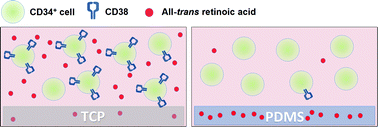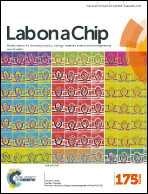Polydimethylsiloxane (PDMS) modulates CD38 expression, absorbs retinoic acid and may perturb retinoid signalling
Abstract
Polydimethylsiloxane (PDMS) is the most commonly used material in the manufacture of customized cell culture devices. While there is concern that uncured PDMS oligomers may leach into culture medium and/or hydrophobic molecules may be absorbed into PDMS structures, there is no consensus on how or if PDMS influences cell behaviour. We observed that human umbilical cord blood (CB)-derived CD34+ cells expanded in standard culture medium on PDMS exhibit reduced CD38 surface expression, relative to cells cultured on tissue culture polystyrene (TCP). All-trans retinoic acid (ATRA) induces CD38 expression, and we reasoned that this hydrophobic molecule might be absorbed by PDMS. Through a series of experiments we demonstrated that ATRA-mediated CD38 expression was attenuated when cultures were maintained on PDMS. Medium pre-incubated on PDMS for extended durations resulted in a time-dependant reduction of ATRA in the medium and increasingly attenuated CD38 expression. This indicated a time-dependent absorption of ATRA into the PDMS. To better understand how PDMS might generally influence cell behaviour, Ingenuity Pathway Analysis (IPA) was used to identify potential upstream regulators. This analysis was performed for differentially expressed genes in primary cells including CD34+ haematopoietic progenitor cells, mesenchymal stromal cells (MSC), and keratinocytes, and cell lines including prostate cancer epithelial cells (LNCaP), breast cancer epithelial cells (MCF-7), and myeloid leukaemia cells (KG1a). IPA predicted that the most likely common upstream regulator of perturbed pathways was ATRA. We demonstrate here that ATRA is absorbed by PDMS in a time-dependent manner and results in the concomitant reduced expression of CD38 on the cell surface of CB-derived CD34+ cells.

- This article is part of the themed collection: Lab on a Chip Recent Open Access Articles

 Please wait while we load your content...
Please wait while we load your content...